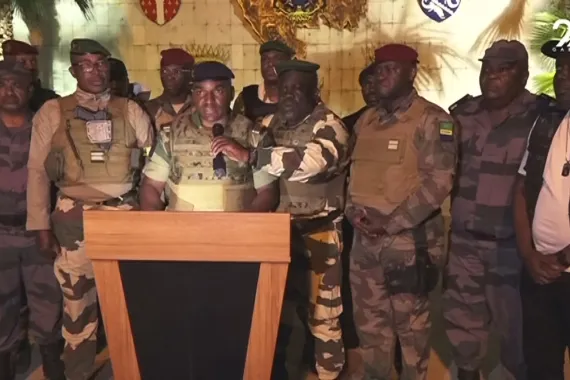
A coup attempt has unfolded in Gabon as a group of mutinous soldiers announced on national television the cancellation of recent election results and the dissolution of all state institutions. President Ali Bongo Ondimba, who had been re-elected for a third term in a controversial election, is reported to be under house arrest. The soldiers claimed to represent the “Committee for the Transition and Restoration of Institutions.” The announcement was accompanied by gunfire in the capital, Libreville. The coup follows allegations of election fraud by the opposition and signals a major political shift for the country.
President Bongo’s Arrest and Son’s Detainment
The coup leaders disclosed that President Bongo is under house arrest, surrounded by family and medical personnel. Additionally, his son and close adviser, Noureddin Bongo Valentin, along with other high-ranking officials, have been arrested on charges including treason, corruption, and falsifying official documents.
International Reactions
The international community has responded with concern and calls for a peaceful resolution. China has urged all parties to prioritize national peace and stability and guarantee President Bongo’s safety. France, Gabon’s former colonial power, condemned the coup and emphasized the need to respect the election results.
Analysis: The End of the Bongo Era
Political analyst Adama Gaye suggests that the coup signifies the end of the Bongo era in Gabon. He cites widespread dissatisfaction with President Bongo’s rule, coupled with allegations of electoral manipulation and corruption. The military’s intervention was seen as a response to an attempt by Bongo to consolidate power through a rigged election. The situation reflects a broader trend of military coups in the region, with growing discontent over governance and power dynamics.
Economic and Diplomatic Implications
The coup has prompted concerns over economic stability and foreign relations. French oil company TotalEnergies announced the suspension of operations in Gabon for employee safety. Additionally, France’s evolving foreign policy toward Africa, which now requires invitations from regional bodies for military intervention, indicates a shift away from direct intervention.
Gabon’s Immediate Future
As the coup unfolds, citizens have reportedly taken to the streets to celebrate. The mutiny signals a turning point for Gabon, with military officers taking action against what they perceive as electoral irregularities and corruption. The outcome remains uncertain as the country navigates through this transition, prompting international observers to closely monitor developments.
If the overthrow of President Ali Bongo is confirmed, Gabon would be the latest French-speaking nation in West African nation to experience a coup – following Mali, Burkina Faso, Guinea and most recently Niger. In total, this would be the eighth coup in former French colonies in Africa in the past three years and could challenge Western democracy in Africa.
Soldiers Applauded in Streets of Capital
Residents of Gabon’s capital, Libreville, have been applauding soldiers in the streets following the announcement of the army’s takeover this morning. According to a Reuters reporter, hundreds of people are celebrating in the city center.














